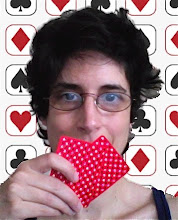Disparate Results
I played in a deepstack tournament last night that celebrated my A League's 500th game. (I have only been around for the last couple of years, but the league has a much longer history that antedates my participation.)
This game featured a larger-than-usual buy-in. There were sixteen participants, and I finished second. As with any tournament, to make the money I needed to get luckier than I deserved a couple of times. But also, with a few minor wobbles, I played every hand as best I know how and I remained focused throughout. I came back from a short stack though a combination of good fortune, patience, and fierce selective aggression.
This is in stark contrast to my performance during the WSOP subscription series with essentially the same bunch of players. You would think that if there were a causal relationship between the size of the stakes and my likeliness to go off the rails, that that correlation would manifest itself in these bigger buy-in games as well. But, for what it's worth, I won the two previous such games that the A League has held.
Now, obviously, in both cases the sample size is small. We've had 8 WSOP-series games and 3 bigger buy-in tournaments. It's an impossibly small number from which to derive any statistically meaningful information. It could all just be coincidence and variance. But something about this pattern is nagging at me, and I'd like to see if I can figure out whether there's anything more to it than a normal distribution of results.
One other thing worth mentioning: the deepstack structures (one with antes, one without) that we use for these more expensive games really go a long way to making skill a larger component of the outcome. I was impressed last night by how long it took to thin the field. We started with 10K in chips, had 30 minute blind levels, and didn't get down to 10 players until after nearly 7 hours. This group's average skill-level has also improved dramatically in the two years I've been playing with them. The level of play compares favorably with that I've encountered in big tournaments in Atlantic City and Las Vegas.
If I ever manage to succeed in a major poker tournament, it will be at least in part because of the many hours of experience I've accumulated playing against tough opponents in my homegrown poker league. I am fortunate to have been able to participate in a well-run organization with other players who are dedicated students of the game.
Labels: results, tournament

1 Comments:
Homegrown poker leagues are a great way to sharpen your game. I love them as I also play in one. Its helped my game and as you said the quality of everybody's play has improved dramatically
Post a Comment
<< Home